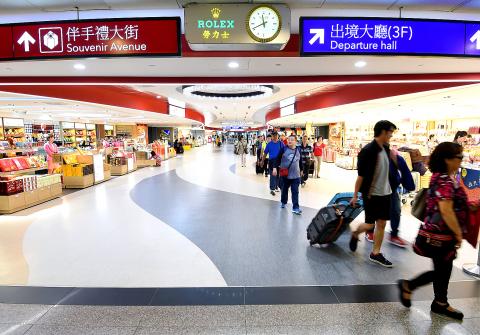Taoyuan International Airport Corp is planning to build a smaller terminal prior to the construction of Taiwan Taoyuan International Airport’s Terminal Three to cope with a rapid increase in the number of passengers arriving in the nation.
The airport’s Terminal One and Terminal Two have a combined capacity of 32 million passengers per year. However, the airport’s passenger volume last year topped 35 million and is estimated to exceed 40 million this year.
Although there are already plans to build Terminal Three, construction is not expected to be completed until 2020. The company has also begun a project to expand the area of Terminal Two, which is scheduled to be completed in 2017.

Photo: Chu Pei-hsiung, Taipei Times
While the Terminal Two expansion project is to increase the facility’s capacity by 5 million passengers per year, the firm said further expansions are needed, as it estimates that the number of passengers serviced by the airport is to grow at a pace of about 10 percent per year.
Minister of Transportation and Communications Chen Chien-yu (陳建宇) yesterday confirmed that a smaller Terminal Four is to be built first, adding that the airport had already briefed the Ministry of Transportation and Communications and the Executive Yuan about its preliminary plan and is ironing out the details of the project.
According to the company, the increase in passenger volume at the airport in recent years was caused by a rise in the number of tourists arriving in the nation via direct cross-strait flights.
Meanwhile, more Taiwanese have been encouraged to go abroad by a growing number of countries offering visa-waiver programs to travelers from Taiwan.
The company said that it would use the space occupied by Terminal One’s parking lot to build Terminal Four, which is projected to be able to service 5 million travelers per year and accommodate four narrow-body aircraft and one wide-body airplane simultaneously.
While the capacity of Terminal Three is projected to reach 45 million passengers per year by 2042, the firm estimated that 86 million travelers will pass through the airport yearly by 2042, necessitating the construction of Terminal Four to help meet demand.
The company plans for Terminal Four to employ an automated system to automatically adjust lighting and air-conditioning based on the number of passengers inside the terminal.
The company has yet to decide whether to relocate some airlines from Terminals One and Two to Terminal Four, or to allow budget airlines to use the new structure.

CHAOS: Iranians took to the streets playing celebratory music after reports of Khamenei’s death on Saturday, while mourners also gathered in Tehran yesterday Iranian Supreme Leader Ayatollah Ali Khamenei was killed in a major attack on Iran launched by Israel and the US, throwing the future of the Islamic republic into doubt and raising the risk of regional instability. Iranian state television and the state-run IRNA news agency announced the 86-year-old’s death early yesterday. US President Donald Trump said it gave Iranians their “greatest chance” to “take back” their country. The announcements came after a joint US and Israeli aerial bombardment that targeted Iranian military and governmental sites. Trump said the “heavy and pinpoint bombing” would continue through the week or as long

TRUST: The KMT said it respected the US’ timing and considerations, and hoped it would continue to honor its commitments to helping Taiwan bolster its defenses and deterrence US President Donald Trump is delaying a multibillion-dollar arms sale to Taiwan to ensure his visit to Beijing is successful, a New York Times report said. The weapons sales package has stalled in the US Department of State, the report said, citing US officials it did not identify. The White House has told agencies not to push forward ahead of Trump’s meeting with Chinese President Xi Jinping (習近平), it said. The two last month held a phone call to discuss trade and geopolitical flashpoints ahead of the summit. Xi raised the Taiwan issue and urged the US to handle arms sales to

BIG SPENDERS: Foreign investors bought the most Taiwan equities since 2005, signaling confidence that an AI boom would continue to benefit chipmakers Taiwan Semiconductor Manufacturing Co’s (TSMC, 台積電) market capitalization swelled to US$2 trillion for the first time following a 4.25 percent rally in its American depositary receipts (ADR) overnight, putting the world’s biggest contract chipmaker sixth on the list of the world’s biggest companies by market capitalization, just behind Amazon.com Inc. The site CompaniesMarketcap.com ranked TSMC ahead of Saudi Aramco and Meta Platforms Inc. The Taiwanese company’s ADRs on Tuesday surged to US$385.75 on the New York Stock Exchange, as strong demand for artificial intelligence (AI) applications led to chip supply constraints and boost revenue growth to record-breaking levels. Each TSMC ADR represents

State-run CPC Corp, Taiwan (CPC, 台灣中油) yesterday said that it had confirmed on Saturday night with its liquefied natural gas (LNG) and crude oil suppliers that shipments are proceeding as scheduled and that domestic supplies remain unaffected. The CPC yesterday announced the gasoline and diesel prices will rise by NT$0.2 and NT$0.4 per liter, respectively, starting Monday, citing Middle East tensions and blizzards in the eastern United States. CPC also iterated it has been reducing the proportion of crude oil imports from the Middle East and diversifying its supply sources in the past few years in response to geopolitical risks, expanding